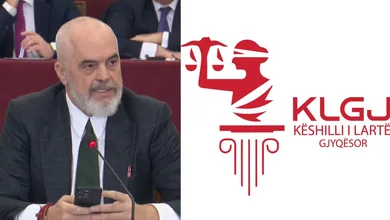
By Ersi Leka
The story of Aida Hajnaj at the head of the National Bureau of Investigation is not simply a closed mandate. It is a clear example of how clientelism and institutional bargaining decide over merit, while institutions remain silent and leave citizens without accountability.
On September 1, 2025, the High Prosecutorial Council (KLP) decided to dismiss Aida Hajnaj from office, arguing that her mandate ended on August 31. The great irony? KLP members met on September 1 to decide whether her mandate had ended “today” or “yesterday.” An absurdity that clearly shows the level of lack of professionalism in an institution that was supposed to be a model of legal clarity.
But the uncertainty was not only evident in the date. Even the chairwoman of the KLP, Mirela Bogdani, herself emphasized the confusion when she read the proposed decision to dismiss Hajnaj from office. Her speech, more than a clear legal explanation, sounded like a mechanical reading of a ready-made text, without providing any argument as to why the KLP had met after the end of the mandate to discuss a fait accompli. This moment showed once again that the leaders of these institutions fail to even provide clear explanations for the decisions they make. Instead of professionalism, a dry bureaucratic speech was seen, which only increased uncertainty and doubts.
The KLP's decision brought up another contradiction. Six members voted that the mandate had ended on August 31, while four others thought that Hajnaj should stay until the election of a successor. But how can there be room for dilemmas in such a clear issue? The mandate specified in the law ends on a fixed date, and beyond that date there is no longer any legal basis to exercise the function. The fact that 4 members chose to vote differently only increased the uncertainty and clearly showed the lack of unity and seriousness within the KLP itself. It was a pointless debate, which should not have existed. If it were not beyond serious, it would seem like a joke: a part of the KLP voted for a fait accompli, just as if it were decided by majority vote whether or not September comes after August.
The truth is that there were no surprises. Even Hajnaj's entry into this position in 2020 was predetermined. Her name was circulating as a sure winner before the competition opened, while the other candidates participated only to complete the procedure. At that time, even the KLP never gave a clear answer on the reasons why she was selected and on the criteria that made her the winner.
One of the most controversial points is the way Hajnaj passed the physical tests, including the running test. To date, no institution has provided a public explanation for her results. The institutional silence has made this moment seem more like a farce: the criteria exist only to be applied to some, while for others they are simply swept under the rug.
However, Hajnaj was unable to run again. She was excluded from the race after failing to submit her documentation within the legal deadline, May 7, 2025.
This case is a reflection of how the system works: the winners are known before the competition begins, the criteria are used as a facade, the institutions are silent, and professionalism is lacking to the point of absurdity of a meeting where a serious discussion is held about whether a leader's mandate ends "today" or "yesterday."
After her departure, SPAK opened the race for the new head of the BKH, with seven candidates on the list. But the question remains the same: will this process be truly transparent and meritocratic, or a repeat of the scenario where the decision has already been made?
Aida Hajnaj's mandate does not end as just a personal page. It is a testament to the lack of professionalism and a grim reflection of a system where clientelism rules over the law, while institutions go so far as to confuse dates and split in two over an issue that had only one clear answer.
The KLP and other justice institutions owe the public full transparency on how appointments are made, how tests are passed, and how mandates are managed. Without true accountability, any process remains a facade, while justice loses its meaning.


















